I’m actually just a little bit divided on G.I. Joe: Retaliation. It is not, by any measure, a good film. It’s messy, it’s muddled, it’s over-complicated and under-developed at the same time, it’s nonsense, it’s dumb, it’s loud and it’s all over the map. However, some small part of me sort of admired that G.I. Joe: Retaliation had managed to so perfectly evoke the sensation of playing with toys. Had you given my eight-year-old self a box of G.I. Joe toys and told me to play for two hours, my playtime might have been plotted somewhat similarly to this film. I will concede that I admire the way that G.I. Joe: Retaliation feels more like a bunch of kids playing with toys than a carefully constructed action movie.
At the same time, however, I’m not afraid to admit that my eight-year-old self would have directed a pretty terrible action film.
I don’t want that to sound disingenuous. It may surprise readers to know that I never really played with G.I. Joe growing up. I’ll concede to a fondness towards Americana, to the point where this year will hopefully see celebratory explorations of pop culture as diverse as Iron Man, Star Trek and even The X-Files. However, I never really got “into” G.I. Joe or Transformers. Still, like any eight-year-old, I had my toys to play with. In an era before DVD or even VHS releases of iconic television shows, I would keep myself occupied in the long lull between airings by playing out my own stories for my favourite characters.
I was obviously far from a master storyteller. Things exploded. I would bash the toys against each whenever I needed an action sequence, but the villains and heroes would always avoid death until the end. I hadn’t full grasp of structure, but I knew I occasionally needed a plot twist. So, all of a sudden, a good guy figure would turn out to be a bad guy wearing a familiar disguise. After all, it couldn’t be too difficult to duplicate an iconic design, right? Or I would force a bad guy to switch sides for some reason, because he was really too cool to lose at the end of the playtime.
I didn’t understand character motivation, but I knew from cartoons that occasionally my little toys would need to yell about emotions, in order to get excited about the upcoming explosions. So I would read the one- or two-sentence character descriptions that came on the back of the packages, and I would imagine a startling twist. The twist would come out of nowhere, of course, because I’d only read the character’s origin two seconds earlier. Still, with a few convenient plot twists – “framed for murder” or “other bad guy in disguise” – I could allow any character to switch sides.
I didn’t think too much about logic – whether in the form of real-world scenarios or internal consistency. At the end of my story, everybody would throw all their explode-y stuff everywhere, because action sequences worked better with lots of explosions. Or, at least, the threat of lots of explosions. I’m pretty sure I was quite fond of the ending where the good guys would convince every country on Earth to fire their nuclear weapons. I was eight, so I didn’t quite appreciate that every nuke on the planet might generate more than just a nice mushroom cloud.
The good guys would fight the bad guys. I didn’t think too much about the match-ups or the logic of at all. I didn’t really know about character motivation, so I just paired up people for what I thought were cool combinations. Ninja vs. guy with a gun? Ninja! Explosives guy vs. musclebound dude? Musclebound dude! Maybe I’d make up an excuse why they’d fight – probably throw in an accusation about murdering a loved one or some nonsense. Nothing too deep. And, once I was finished, I’d tidy up my toys and put them away for another day.
That’s the level on which I almost appreciate G.I. Joe: Retaliation. It’s the way that the script feels like it is being made up as it goes along. It’s the way that a character’s back story is established one second and then radically undermined the next. It’s the way that lots of stuff goes boom and that conquering the world involves nothing more advanced than a killer satellite, and that famous global landmarks are just things that can explode if hit with sufficient force. My eight-year-old self would have played out this story a dozen ways.
My eight-year-old self would have loved concepts like a prison buried so far underground that it was technically in international jurisdiction. I might not have known what the phrase meant, but I knew it was a big deal. My inner child would have loved the idea of a prison that is like being asleep. After all, to an eight-year-old, what worse punishment is there than being made to go to bed early, and to be confined there, even if you can’t sleep? My inner child actually felt a pang of sympathy for poor COBRA Commander and Destro at the start of G.I. Joe: Retaliation, trapped in a perpetual “go to bed early” curfew.
However, I also acknowledge that my eight-year-old self would make a truly terrible script writer and director, and that all these things I sorta like and appreciate about G.I. Joe: Retaliation are the same things that prevent it from being a satisfying movie experience. Plot points are introduced and then dropped. The climax hinges on completely absurd logic, even by the standards of big bombastic action movies. All the characters get to do cool stuff, but none of it is structured.
It feels like Snake Eyes has his own kung-fu movie nested inside Roadblock’s revenge thriller, nested inside COBRA Commander’s “I wanna rule the world” fantasy. The movies chop into one another, stopping and starting, each with their own plot points. As a result, characters are developed in exposition-ladden monologues that feel strangely divorced from the plot we were watching a moment ago, delivered by RZA – who just might be the worst actor to play a mentor figure in the history of cinema.
Indeed, G.I. Joe: Retaliation almost seems to take itself too seriously. The film’s first plot twist involves the brutal massacre of a platoon of US army officers in the desert, a shady ambush leaving only a handful of survivors. As a result, The Rock plays Roadblock like he’s an embittered hero from a seventies revenge thriller. At the same time, nonsense mysticism, ropey CGI and character development play out in a story centred around Storm Shadow, with a revelation that is absurd – but played with a weird gravitas by the film.
Arguably the only performer who strikes the perfect tone is Jonathan Pryce playing a sinister President of the United States. Pryce seems to realise that he has been cast in a live action cartoon – he doesn’t even try to disguise his British accent playing the President of the United States. Pryce does a lot of work selling the more surreal moments of the script, camping it up to absurd levels. Discussing the perks of his position, Pryce observes, “They say it’s a thankless job, but yesterday I got to meet Bono.”
There are moments when the film almost seems to embrace the inherent absurdity of it all. One COBRA goon seems fierce proud of coming up with an acronym that sounds like “HISS.” Indeed, after Roadblock tries to consolidate his crew by quoting Jay-Z, COBRA have a bit more fun name-dropping eighties anthems. “Everybody wants to rule the world,” evil!President suggests. “I want it all,” COBRA Commander boasts at the climax. Even under the mask, I can’t imagine him keeping a straight face had he finished the ultimatum, “And I want it now.”
Sadly, these moments are few and far between. For every self-aware moment where Roadblock comments on the homoerotic undercurrents of the jokes exchanged between himself and Duke, there’s another dull piece of exposition or an in-joke that falls flat. Even my eight-year-old self probably couldn’t have kept a straight face while delivering this, and G.I. Joe: Retaliation suffers because it does take itself too seriously. One of the bad guys boasts about murdering Roadblock’s friends, while the script throws out trite metaphors like “when you fight uphill, you take the hill.”
Still, there are some interesting aspects to G.I. Joe: Retaliation. The Rise of COBRA played very well to middle America, and you can see that Retaliation has been tweaked a little bit to play to that audience. There’s the central plot device where a terrorist infiltrates the White House and names himself President, playing out all those worryingly popular conspiracy theories about the Obama Presidency. The imagery used is designed to resonate with certain segments of the American consciousness.
At one point, a bunch of American soldiers are brutally ambushed in the desert, after they have achieved their mission objective. They might not have banners reading “mission accomplished”, but they are celebrating their easily-won victory – completely unaware of the lurking danger. The bad guys’ evil plan hinges on nuclear disarmament. The moment America throws away its nuclear weapons, they are easy targets for these bad guys.
Indeed, private gun ownership is the logical answer to our heroes’ problems. Hunted by the government, they need to arm themselves to defend the country. One veteran keeps so many guns in his house I’m amazed his kitchen actually functions as a kitchen. Okay, I’ll concede that I’m reading a bit much into it, but it’s quite clear that G.I. Joe: Retaliation does play to certain fears anchored in the American psyche, particularly the conservative American psyche.
I didn’t hate G.I. Joe: Retaliation. I sort of admired the way that it so skilfully emulated the type of plots I used to act out with my action figures when I was a small boy. Unfortunately, I’m not sure that even my eight-year-old self would be held in rapt attention for one of those dramas.
Filed under: Non-Review Reviews | Tagged: Action film, Adrianne Palicki, Channing Tatum, COBRA Commander, Destro, DJ Cotrona, DVD, Dwayne Johnson, gi joe, GI Joe: Retaliation, Joe, jonathan pryce, Retaliation, Roadblock, star trek, Storm Shadow, Toy, transformers, United States |















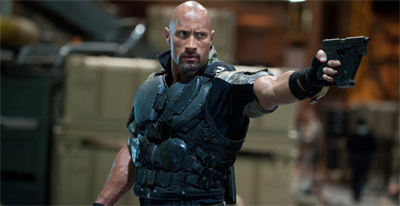
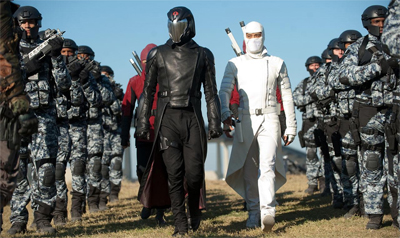
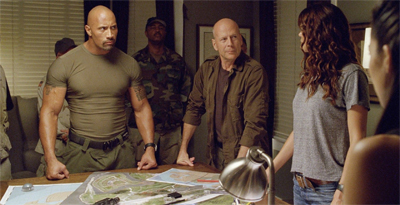
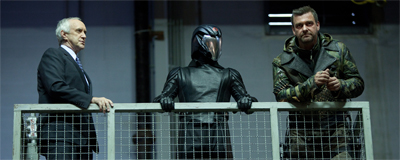
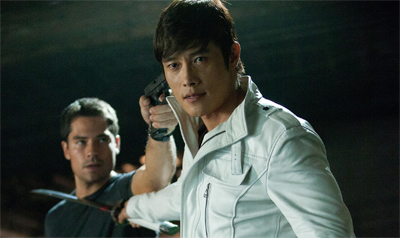
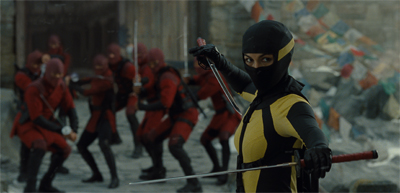
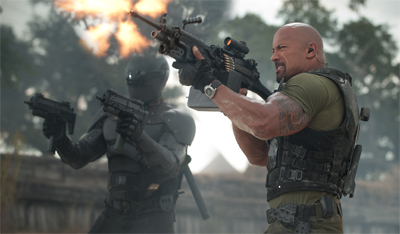
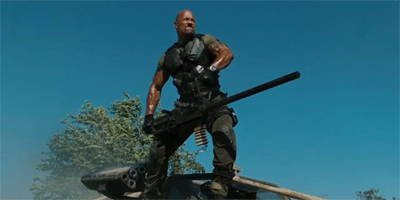
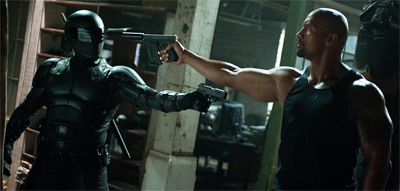





Leave a comment